The 12th installment in this series has arrived after looking at how the Minnesota Wild did in their first 11 drafts. If you missed any of them or want a refresher, you can find those recaps below:
- 2000: Franchise’s Inaugural Draft
- 2001: Minnesota Gets Its Captain
- 2002: Late Round Woes
- 2003: Most Disappointing Draft Yet
- 2004: A Draft With No Standouts
- 2005: Starting the New Era Off with a Whimper
- 2006: More Missed Opportunities
- 2007: Prospect Cupboards Continue Being Empty
- 2008: Another First-Round Bust
- 2009: O.K. Draft to Finish the Decade
- 2010: Best Draft in a Long Time
The 2010-11 NHL season didn’t treat the Wild kindly. While they allowed fewer goals than the previous campaign, their 206 goals scored was the fifth-worst total in the league, which played a role in Minnesota missing the postseason for the third straight year. Nevertheless, the Wild were hoping to finally get back on track through the 2011 NHL Entry Draft. By the end of the night, the organization left the draft with six new prospects. But how many of them turned out to be core pieces of the future? Read on and find out.
Early Rounds (1st and 2nd)
Round 1, 10th Overall – Jonas Brodin, D (Farjestads BK Karlstad, SEL)
The 2011 NHL Entry Draft was the first time in Wild history that the organization made two first-round selections. Their first pick of the draft was the 10th-overall pick, which they used on Swedish defenseman Jonas Brodin. Heading into the draft, he was described as a “two-way defenseman” who had “very good mobility and skating ability.”
As a 17-year-old in the 2010-11 season, he played 42 games with Farjestads BK Karlstad of the Swedish Elite League (now known as the Swedish Hockey League), tallying four assists and a plus-6 plus/minus rating. He also scored two goals in 14 games as he played a big role in Färjestad BK’s road to winning the league championship. Obviously, Minnesota liked what they saw in him as the team signed him to his entry-level contract just a few weeks after drafting him.
After spending another year in Sweden (which included winning a gold medal with Sweden at the 2012 IIHF World Juniors), Brodin came over to North America in the lockout-shortened 2012-13 NHL season. He started the year by playing nine games for the Houston Aeros in the American Hockey League (AHL), putting up two goals and two assists during that span. When the NHL season finally began, the Wild gave him a shot at playing for them and he never looked back. He played a total of 45 games that season, putting up 11 points as he helped Minnesota return to the playoffs for the first time since 2007-08. He also finished fourth in Calder Memorial Trophy voting and was named to the NHL’s All-Rookie Team.
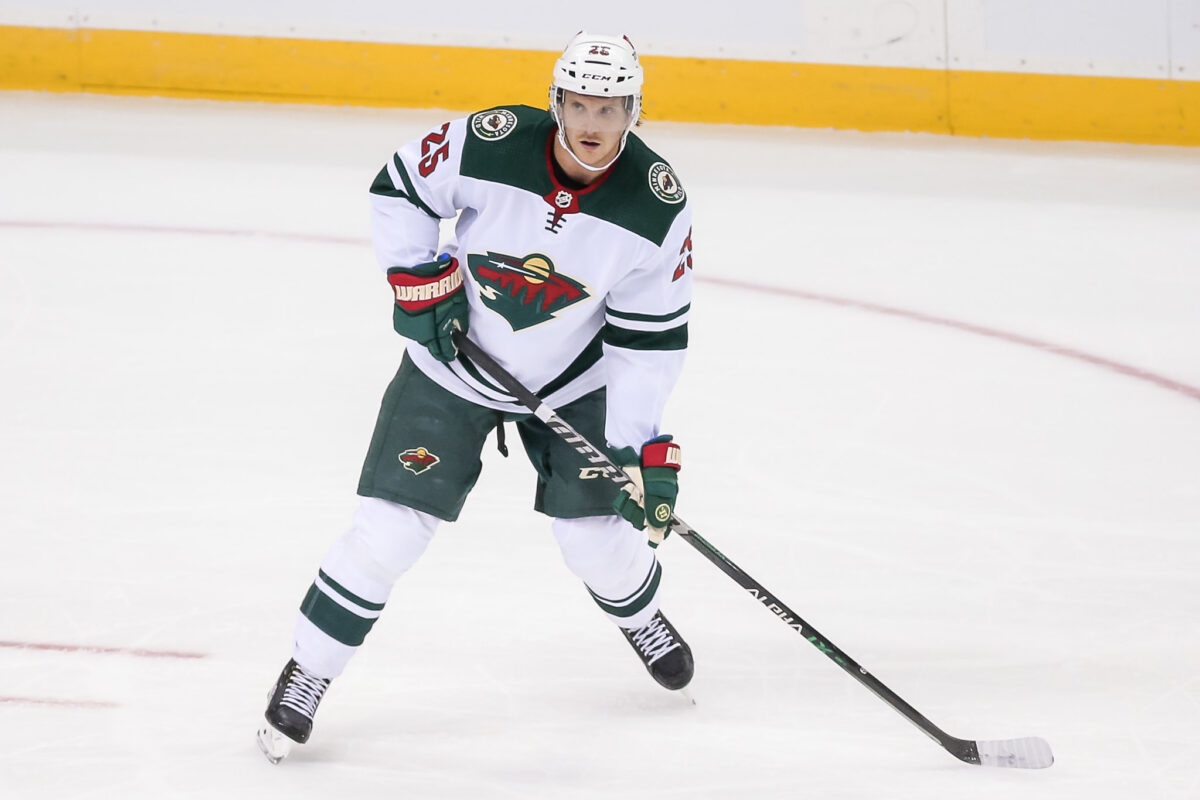
Brodin showed in his sophomore season that his rookie campaign wasn’t a fluke, putting up eight goals and 19 points in 79 games. That isn’t even mentioning that he was averaging 23:54 time on ice that season, which is seriously impressive for a 20-year-old defenseman. Nevertheless, he has continued to be an anchor on the Wild’s blue line in each of the following seasons. One issue that fans have had with him, though, is his inconsistency.
Make no mistake about it: Brodin is one of the better defensemen in the NHL when he’s on top of his game, as proven by how he’s finished top-20 in James Norris Memorial Trophy voting twice in his career. Unfortunately, he’s also put up some underwhelming seasons. For example, in the 2017-18 season, he put up 21 points and was a team-best plus-23. However, he was a team-worst minus-15 in the following season despite his ice time being cut back by just over a full minute.
Fortunately, Brodin has been back at the top of his game over the last two seasons. In fact, he’s even managed to increase his offensive output as he had 53 points in 126 games between 2020-21 and 2021-22 (0.42 points per game). JFresh Hockey even had him listed as one of the top defensive defensemen in the NHL as recently as a year ago, which shows just how important he is to the franchise. If he can continue playing that way for the remainder of his seven-year, $42 million contract, he will remain as one of the best defensemen in Wild history.
Round 1, 28th Overall – Zack Phillips, C (Saint John Sea Dogs, QMJHL)
While the Wild’s first pick of the 2011 Draft has been a focal point of the franchise for nearly a decade, the same can’t be said for their second selection. Minnesota drafted Saint John Sea Dogs center Zack Phillips with the 28th-overall pick of the night, attempting to find a prospect who could give the club an offensive spark. After all, the younger center recorded 95 points in 67 games in the 2010-11 Quebec Major Junior Hockey League (QMJHL) season, which eventually culminated in the Sea Dogs winning the league championships. Rather than forcing him into the lineup, the Wild left him in Saint John for another year, which seemed to be the right call as he led his team to another QMJHL championship.
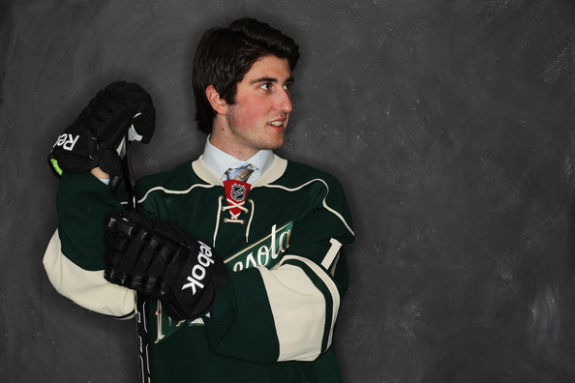
The Wild gave Phillips a crack in the AHL in the 2012-13 season, where he finished the year with eight goals and 19 assists in 71 games. Unfortunately, he didn’t show a lot of signs of development as he scored just 48 points over his next two seasons in the minors. Eventually, the Wild saw him as being expendable, which is why they traded him to the Boston Bruins in March 2015 for former 2010 second-round pick Jared Knight. The deal was a wash for both sides as neither player played a single game in the NHL before heading over to Europe in the 2016-17 season.
Phillips attempted a North American comeback in the 2019-20 season; however, he was stuck playing in the ECHL. After recording just nine points in 31 games across three teams, he headed back to Europe where he still plays to this day for Unia Oswiecim in Poland.
Round 2, 60th Overall – Mario Lucia, F (Wayzata High School, Minnesota)
One thing that the Wild enjoyed doing in their earlier drafts was selecting at least one local player and that wasn’t any different in 2011. The team selected Wayzata High School forward Mario Lucia with the 60th-overall pick after he tallied 47 points in 24 games as a senior. He spent the following season with the Penticton Vees of the British Columbia Hockey League, showing a lot of offensive upside to the tune of 42 goals and 52 assists in just 56 games. He then shifted his focus to playing collegiate hockey for Notre Dame for the next four seasons, finishing his time at the school with 110 points across 151 contests.
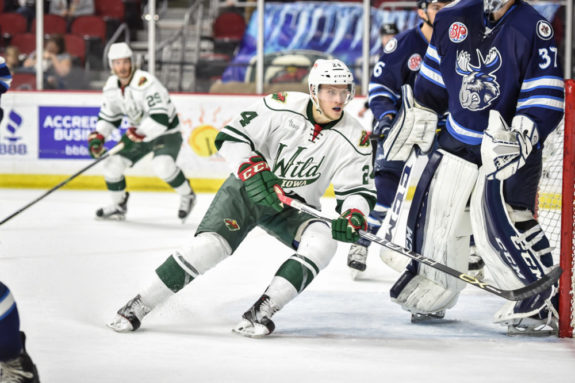
Even though he didn’t dominate collegiate hockey as he did in the previous leagues he played in, Lucia still earned an entry-level contract with the Wild during the 2015-16 NHL season. Unfortunately, nothing ever came from his run with the team. He was held to Minnesota’s AHL affiliate in Iowa, where he played 93 games over parts of three seasons without seeing a lick of time in the NHL. The Wild eventually traded Lucia in February 2018, shipping him and fellow forward Christoph Bertschy off to the New Jersey Devils in exchange for defenseman Viktor Loov. Much to his dismay, Lucia didn’t show any promise with his new team, leading to him continuing his hockey career in Europe in the following season. He’s since remained there, most recently playing for the Rungsted Seier Capital in Denmark during the 2019-20 season.
Late Rounds (4th — 7th)
Round 5, 131st Overall –Nick Seeler, D (Eden Prairie High School, Minnesota)
After sitting idle for nearly three rounds, the Wild were back on the clock in Round 5. The team opted to go with their second defenseman of the draft, selecting another local prospect in Nick Seeler from Eden Prairie High School. Minnesota isn’t a stranger when it comes to drafting defensemen from that school, as 2009 first-rounder Nick Leddy is also an Eden Prairie alumnus. Like Leddy, Seeler showed some offensive promise during his senior year, finishing fourth in team scoring with 34 points. He spent the next four years spending time in the United States Hockey League and NCAA where he adopted more of a two-way style to his game.
With a lot of hype surrounding him, Seeler made his professional debut in the 2016-17 season, playing 57 games for the Iowa Wild of the AHL. Unfortunately, his offense was nowhere to be found as he ended the campaign with five assists without a goal. Instead, he found himself in the penalty box a lot. His 109 penalty minutes that season were the most on the team, as well as being good for third-highest among all AHL rookies. The good news is that he bounced back in the following year, recording 12 points in 49 games while also taking 35 fewer penalty minutes. His efforts rewarded him with 22 games in the NHL that season, where he put up four assists and was a plus-10 rating. He was called up full-time in 2018-19, playing 71 games, but he never took that next step forward that the Wild hoped he would.
Minnesota waived Seeler in Feb. 2020 after he played just 12 total games split across the NHL and the AHL. The Chicago Blackhawks claimed him off waivers, leading to him playing six games for them before the COVID-19 pandemic postponed the season. Rather than bringing him back for the following year, the Blackhawks bought him out ahead of the 2020-21 campaign, which resulted in him sitting out for the year. He’ll now attempt to continue his NHL career as a member of the Philadelphia Flyers after signing a one-year, two-way deal back at the end of July 2021. He played well enough to sign a new two-year deal with the Flyers in May 2022.
Round 6, 161st Overall –Steve Michalek, G (Loomis-Chafee High School, Connecticut)
With the 161st-overall pick of the 2011 Draft, the Wild selected their fourth goaltender in the last three years when they drafted Steve Michalek. After backstopping his way to a couple of impressive seasons at Loomis-Chafee High School in Connecticut, he committed to playing collegiate hockey at Harvard University. While his run with the school started slow, Michalek improved with each passing season. His best performance came in 2014-15 where he finished with a 21-13-3 record, 2.28 goals-against average (GAA), .924 save percentage (SV%) and three shutouts en route to winning an NCAA championship with Harvard.
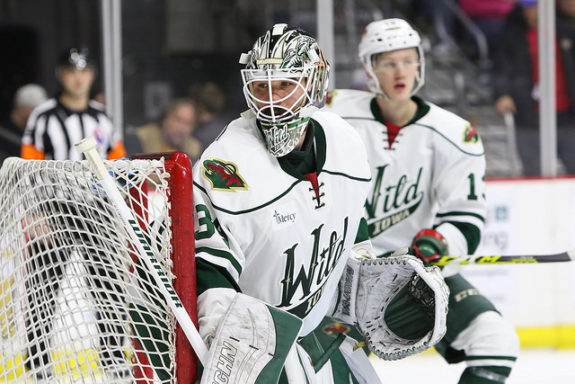
Rather than rushing him into the NHL or even AHL after signing his entry-level contract, the Wild had Michalek begin his professional career with the Quad City Mallards of the ECHL. It definitely seemed like the right call as the Hartford, CT native finished the year with a 2.42 GAA and.924 SV% with a pair of shutouts in 24 appearances. His efforts didn’t go unnoticed as the Wild used him in a backup role in Iowa over the following two seasons. He remained consistent in the 2016-17 season with a .919 SV% while maintaining the same GAA as the previous season despite going 13-14-1. Unfortunately, he found himself regressing a bit the following season as he split time between the AHL and ECHL. After a one-year stint in Austria, he called it a career and currently works in Boston as a business development representative.
Round 7, 191st Overall –Tyler Graovac, C (Ottawa 67’s, OHL)
The Wild finished the 2011 NHL Entry Draft by selecting another forward out of Canada. This time it was Ottawa 67’s center Tyler Graovac, who was coming off of a 21-point performance in his draft year. While he was far from an offensive dynamo, he had an impressive 6-foot-5 frame that could do some damage as a bottom-six forward with proper development. It turned out that leaving him in the Ontario Hockey League (OHL) for a few more seasons was a good call as he put on his best performance in the 2012-13 season, scoring 73 points in 60 games. Not only that, but he also won the William Hanley Trophy (the OHL’s version of the Lady Byng Trophy) and was named the Canadian Hockey League’s Sportsman of the Year.
You may also like:
- Wild Report Cards 2023-24: Vinni Lettieri
- Wild Report Cards 2023-24: Brandon Duhaime
- Minnesota Wild Report Cards 2023-24: Connor Dewar
- 4 NHL General Managers on the Hot Seat This Season
- NHL’s 5 Most Overrated General Managers
Most of Graovac’s tenure with the Wild was spent in the AHL. While he recorded 102 points in 202 games with Iowa (0.50 points per game), he couldn’t translate that into success at the NHL level. He played a total of 57 games for Minnesota between 2014 and 2017, scoring just seven goals while assisting on two others during that span. The Wild then shipped him off to the Washington Capitals in exchange for a 2018 fifth-round pick in June 2017, marking the end of his tenure with the franchise.
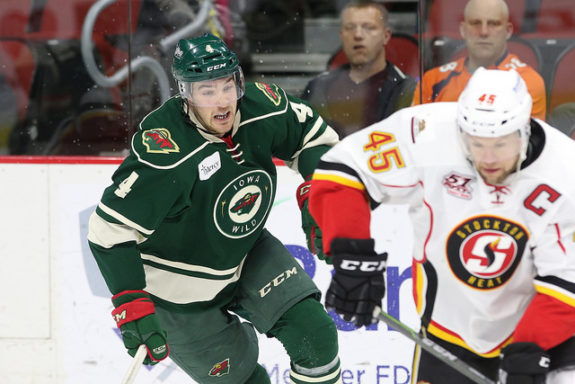
Graovac had his best AHL season to date with the Stockton Heat during the 2018-19 campaign, recording 50 points while leading the team with 24 goals. His efforts rewarded him with a one-year, two-way contract to play with the Vancouver Canucks in the following season, however, a lower-body injury held him to just 19 total games split between the AHL and NHL that year. The Canucks hoped that he could bounce back, which is why they signed him to the same deal ahead of the 2020-21 NHL season. He finished the year with four points in 14 games with the Canucks while also playing at a point-per-game pace with the Utica Comets in the AHL (nine points in nine games). Rather than signing with another NHL club over the offseason, he signed with the Kontinental Hockey League’s HC Dinamo Minsk for the 2021-22 season. Only time will tell if this path leads to an NHL return one day.
Overall Grade: B-
Had it not been for Brodin, the Wild’s performance at the 2011 NHL Entry Draft would be graded a lot worse. Nevertheless, they did leave the draft with one of the best defensemen of the class, so that counts for something. On the other hand, no one else from the Wild’s prospect haul in 2011 amounted to much of anything else. If you remove Brodin from the equation, the other five players played a total of 189 games and none of those was played by the other two prospects drafted in the first two rounds. Needless to say, this draft proved that the Wild had a lot of work to do when it came to improving their amateur scouting.
